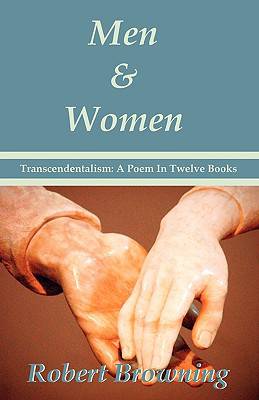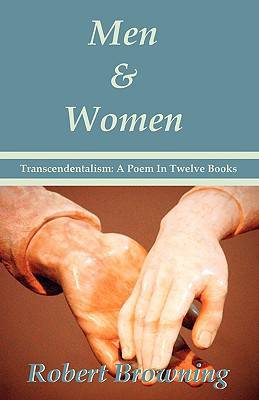
- Afhalen na 1 uur in een winkel met voorraad
- Gratis thuislevering in België vanaf € 30
- Ruim aanbod met 7 miljoen producten
- Afhalen na 1 uur in een winkel met voorraad
- Gratis thuislevering in België vanaf € 30
- Ruim aanbod met 7 miljoen producten
Zoeken
Men And Women by Robert Browning
Transcendentalism: A Poem In Twelve Books - Special Edition
Robert Browning
Paperback | Engels
€ 22,45
+ 44 punten
Omschrijving
"Men and Women" was Robert Browning's first published work after a self-imposed five year hiatus, and his first collection of shorter poems since his marriage to Elizabeth Barrett in 1846.
Upon publication in 1855, "Men and Women," containing fifty-one seemingly random poems, was not a critical or financial success. During this period, Browning felt overshadowed by the stellar success of his wife. Later in life, renewed public interest in his writing would elevate Robert Browning into the pantheon of greatest poets.
Thirteen years after the publication of "Men and Women," Browning revisited the collection, and a new vision emerged. He separated the simpler, emotionally rhymed poems, such as "Mesmerism" and "A Woman's Last Word," and the picturesque rhymed verse, such as "Childe Roland" and "The Statue and the Bust," from their more complex companions, such as "Cleon," "Fra Lippo," and "Rudel".
Finally, Browning succeeded in producing the dramatic concept he had tried to communicate two decades earlier, not by adding, but by removing stray conceptual pieces. This volume was then published as "Transcendentalism: A Poem In Twelve Books" to a frenzied reception. This large sized special edition contains the restored manuscript of Robert Browning's unique poetic masterpiece.
Excerpt From "Andrea Del Sarto" in "Men and Women"
All Rights Reserved
But do not let us quarrel any more,
No, my Lucrezia; bear with me for once:
Sit down and all shall happen as you wish.
You turn your face, but does it bring your heart?
I'll work then for your friend's friend, never fear,
Treat his own subject after his own way,
Fix his own time, accept too his own price,
And shut the money into this small hand
When next it takes mine. Will it? tenderly?
Oh, I'll content him--but to-morrow. Love!
I often am much wearier than you think,
This evening more than usual, and it seems
As if--forgive now--should you let me sit
Here by the window with your hand in mine
And look a half-hour forth on Fiesole,
Both of one mind, as married people use,
Quietly, quietly the evening through,
I might get up to-morrow to my work
Cheerful and fresh as ever. Let us try.
Upon publication in 1855, "Men and Women," containing fifty-one seemingly random poems, was not a critical or financial success. During this period, Browning felt overshadowed by the stellar success of his wife. Later in life, renewed public interest in his writing would elevate Robert Browning into the pantheon of greatest poets.
Thirteen years after the publication of "Men and Women," Browning revisited the collection, and a new vision emerged. He separated the simpler, emotionally rhymed poems, such as "Mesmerism" and "A Woman's Last Word," and the picturesque rhymed verse, such as "Childe Roland" and "The Statue and the Bust," from their more complex companions, such as "Cleon," "Fra Lippo," and "Rudel".
Finally, Browning succeeded in producing the dramatic concept he had tried to communicate two decades earlier, not by adding, but by removing stray conceptual pieces. This volume was then published as "Transcendentalism: A Poem In Twelve Books" to a frenzied reception. This large sized special edition contains the restored manuscript of Robert Browning's unique poetic masterpiece.
Excerpt From "Andrea Del Sarto" in "Men and Women"
All Rights Reserved
But do not let us quarrel any more,
No, my Lucrezia; bear with me for once:
Sit down and all shall happen as you wish.
You turn your face, but does it bring your heart?
I'll work then for your friend's friend, never fear,
Treat his own subject after his own way,
Fix his own time, accept too his own price,
And shut the money into this small hand
When next it takes mine. Will it? tenderly?
Oh, I'll content him--but to-morrow. Love!
I often am much wearier than you think,
This evening more than usual, and it seems
As if--forgive now--should you let me sit
Here by the window with your hand in mine
And look a half-hour forth on Fiesole,
Both of one mind, as married people use,
Quietly, quietly the evening through,
I might get up to-morrow to my work
Cheerful and fresh as ever. Let us try.
Specificaties
Betrokkenen
- Auteur(s):
- Uitgeverij:
Inhoud
- Aantal bladzijden:
- 156
- Taal:
- Engels
Eigenschappen
- Productcode (EAN):
- 9781934255216
- Verschijningsdatum:
- 1/09/2009
- Uitvoering:
- Paperback
- Formaat:
- Trade paperback (VS)
- Afmetingen:
- 140 mm x 216 mm
- Gewicht:
- 204 g

Alleen bij Standaard Boekhandel
+ 44 punten op je klantenkaart van Standaard Boekhandel
Beoordelingen
We publiceren alleen reviews die voldoen aan de voorwaarden voor reviews. Bekijk onze voorwaarden voor reviews.













